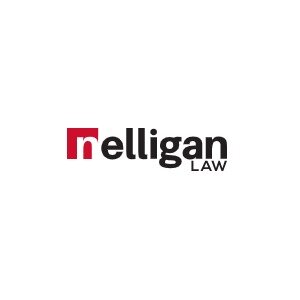Best Nonprofit & Charitable Organizations Lawyers in Ottawa
Share your needs with us, get contacted by law firms.
Free. Takes 2 min.
List of the best lawyers in Ottawa, Canada

KENTUADEI ADEFE, FOREIGN LEGAL CONSULTANT ON NIGERIAN LAW
15 minutes Free ConsultationAbout Nonprofit & Charitable Organizations Law in Ottawa, Canada
Nonprofit and charitable organizations in Ottawa, Canada, operate under specific legal frameworks that guide their establishment, operation, and governance. These organizations are formed to address various societal needs without the purpose of profit-making. They encompass a wide spectrum, from small community groups to large, well-established charities. Ottawa serves as a vibrant hub for nonprofits, often focusing on social, cultural, educational, and environmental initiatives. Navigating the legal landscape requires understanding both federal and provincial laws, as well as compliance with various regulations that ensure the organization's integrity and public trust.
Why You May Need a Lawyer
There are several situations where legal expertise becomes crucial for nonprofit and charitable organizations:
- Incorporation and Registration: Assistance in forming the legal entity and obtaining charitable status.
- Compliance and Regulatory Matters: Ensuring adherence to federal and provincial regulations.
- Governance and Bylaws: Drafting or reviewing governance documents to ensure they meet legal standards.
- Taxation Issues: Navigating taxation laws that affect nonprofits and their ability to issue tax receipts.
- Contracts and Agreements: Legal review of contracts such as leases, vendor agreements, and partnerships.
- Dispute Resolution: Representation in disputes involving stakeholders or regulatory bodies.
Having legal guidance can help prevent costly legal issues and ensure that the organization operates within the law.
Local Laws Overview
The legal landscape for nonprofit and charitable organizations in Ottawa is governed by a combination of federal, provincial, and municipal laws:
- Canada Not-for-profit Corporations Act: This federal law governs the incorporation and operation of not-for-profit organizations in Canada.
- Charities Registration: To obtain charitable status and issue tax receipts, organizations must register with the Canada Revenue Agency (CRA) and comply with its regulations.
- Ontario's Non-Profit Corporations Act: This provincial statute governs Ontario-based nonprofits, including their formation, structure, and dissolution.
- Employment Standards: Nonprofits must adhere to Ontario employment laws relating to staffing, benefits, and workplace safety.
- City of Ottawa Bylaws: Local bylaws may affect where and how nonprofits operate within city limits.
Understanding these legal nuances is key to the efficient operation and longevity of a nonprofit or charitable organization.
Frequently Asked Questions
1. How do I start a nonprofit organization in Ottawa?
You begin by deciding on a legal structure, such as a corporation, drafting your bylaws, incorporating provincially or federally, and registering as a charity with CRA if applicable.
2. What are the benefits of obtaining charitable status in Canada?
Charitable status allows an organization to issue official donation receipts for income tax purposes and may provide certain tax exemptions.
3. What is the difference between a nonprofit and a charity?
A nonprofit operates without profit motives, while a charity must conform to legal purposes deemed charitable and can issue tax receipts for donations.
4. Can I pay myself a salary if I run a nonprofit?
Yes, as long as the compensation is reasonable and disclosed in line with governing laws and policies.
5. What is the role of a board of directors in a nonprofit?
The board provides strategic leadership, oversees operations, ensures compliance, and acts in the organization's best interest.
6. Do nonprofits need to file annual reports?
Yes, most incorporated nonprofits must file annual returns or reports with governmental bodies such as Corporations Canada or the relevant provincial authority.
7. How do I maintain compliance with the CRA as a charity?
By adhering to regulations regarding record-keeping, issuing proper receipts, conducting transparent financial reporting, and submitting annual returns.
8. Are there restrictions on political activities for charities?
Charities can engage in non-partisan political activities related to their purposes, but these must not dominate their activities.
9. What should be included in nonprofit bylaws?
Bylaws should cover governance structure, decision-making processes, member roles, meetings, and other operational guidelines.
10. Can a nonprofit partner with for-profit businesses?
Yes, partnerships can occur, but organizations must ensure these align with their mission and comply with legal obligations.
Additional Resources
- Canada Revenue Agency (CRA): Provides guidelines for charities and nonprofits.
- ServiceOntario: Offers resources for incorporating and managing organizations under the Ontario Not-for-profit Corporations Act.
- Imagine Canada: An organization that supports Canadian charities and nonprofits.
- Volunteer Ottawa: Connects volunteers with opportunities and offers training and resources to nonprofits.
Next Steps
If you require legal assistance, consider the following steps:
- Identify Your Needs: Clearly define the type of legal help required based on your organization's situation.
- Consult with Legal Experts: Reach out to lawyers specializing in nonprofit and charitable organization law for tailored advice.
- Use Pro Bono Services: Explore free or reduced-cost legal services offered by clinics or legal aid societies in Ottawa.
- Stay Informed: Regularly update your knowledge on legal obligations and best practices for nonprofits.
Engaging with skilled professionals can provide peace of mind and ensure the longevity and compliance of your nonprofit or charitable organization.
Lawzana helps you find the best lawyers and law firms in Ottawa through a curated and pre-screened list of qualified legal professionals. Our platform offers rankings and detailed profiles of attorneys and law firms, allowing you to compare based on practice areas, including Nonprofit & Charitable Organizations, experience, and client feedback.
Each profile includes a description of the firm's areas of practice, client reviews, team members and partners, year of establishment, spoken languages, office locations, contact information, social media presence, and any published articles or resources. Most firms on our platform speak English and are experienced in both local and international legal matters.
Get a quote from top-rated law firms in Ottawa, Canada — quickly, securely, and without unnecessary hassle.
Disclaimer:
The information provided on this page is for general informational purposes only and does not constitute legal advice. While we strive to ensure the accuracy and relevance of the content, legal information may change over time, and interpretations of the law can vary. You should always consult with a qualified legal professional for advice specific to your situation.
We disclaim all liability for actions taken or not taken based on the content of this page. If you believe any information is incorrect or outdated, please contact us, and we will review and update it where appropriate.








